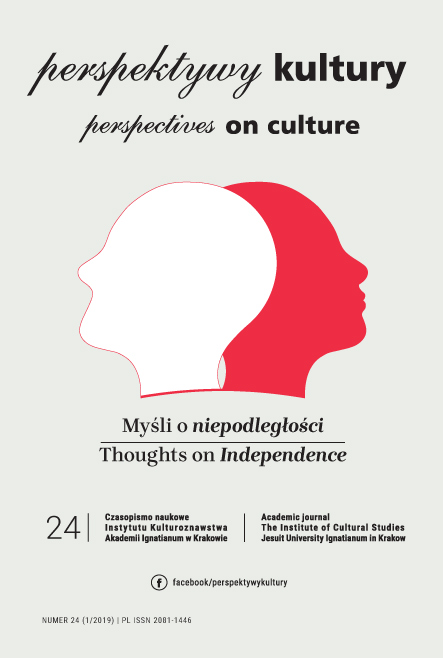Joseph Conrad’s Independence Journalism and its “Post‑romantic Entanglement”
Abstract
The following study of a small collection of Conrad’s journalism related to Polish independence distinguishes The Crime of Partition as the final and most mature voicing of the Polish-Romantic, tyrtaean, and balladic intertextuality of Lord Jim’s author. Conrad, however, while referring to Adam Mickiewicz’s Lilie and The Books and the Pilgrimage of the Polish Nation, does maintain some distance from his allusions and reminiscences. Rather, the romanticizing that saturates the sketch integrates the entire argument, and what is more, it also promotes intriguing intellectualization: the Polish literary tradition, here reduced to a colorful convention (e.g. frenetic, as in Lilie), released from its “limiting” framework, is a kind of carefully planned, sophisticated literary play for Conrad. It can be appreciated by Conrad’s non- Polish reader, uninitiated in the pathos of the Polish problem, the one to whom the writer speaks in particular in this case.
References
Karola Zagórska. Pod dachem Konrada Korzeniowskiego (Josepha Con¬rada). (2006). In: Z. Najder & J. Skolik (eds.), Polskie zaplecze Josepha Conrada-Korzeniowskiego. Dokumenty rodzinne, listy, wspomnienia, vol. 2. Lublin.
Adamowicz-Pośpiech, A. (2016). Autobiografia antykonfesyjna. In: idem, Po¬dróże z Conradem. Szkice. Kraków.
Busza, A. (1978). The Rhetoric of Conrad’s Non-Fictional Political Discour¬se. Annales de la Faculte des Lettres et Sciences Humaines de Nice, 34.
Conrad, J. (1927a). Do Edwarda Garnetta, 22 grudnia 1918. In: G. Jean-Au¬bry, Joseph Conrad. Life and Letters, vol. II. London.
Conrad, J. (1927b). Do G.T. Keatinga, 14 grudnia 1922. In: G. Jean-Aubry, Joseph Conrad. Life and Letters, vol. II. London.
Conrad, J. (1927c). Do Johna Galsworthy’ego, 24 grudnia 1918. In: G. Jean¬-Aubry, Joseph Conrad. Life and Letters, vol. II. London.
Conrad, J. (1996). Zbrodnia rozbiorów. In: idem, Dzieła, edited by and with an introduction from Z. Najder, vol. XXVIII: Szkice polityczne. Warszawa.
Conrad, J. (2004). The Crime of Partition. In: J. Conrad, The Works of Joseph Conrad. Notes on Life and Letters, ed. by J.H. Stape with the assistance of A. Busza. Cambridge: Cambridge University Press.
Conrad, J. (2006a). 212. Do Józefa Hieronima Retingera, Capel House, Orle¬ston koło Ashford, 21 sierpnia 1916. In: Z. Najder & J. Skolik (eds.), Pol¬skie zaplecze Josepha Conrada-Korzeniowskiego. Dokumenty rodzinne, listy, wspomnienia, vol. 2. Lublin.
Conrad, J. (2006b). 215. Do Romana Dmowskiego [Capel House], 1 paź¬dziernika 1917. In: Z. Najder & J. Skolik (eds.), Polskie zaplecze Josepha Conrada-Korzeniowskiego. Dokumenty rodzinne, listy, wspomnienia, vol. 2. Lublin.
Conrad, J. (2006c). 216. Joseph Conrad do Eustachego Sapiehy, Oswalds, Bishopsbourne, Kent, 20 lutego 1920. In: Z. Najder & J. Skolik (eds.), Pol¬skie zaplecze Josepha Conrada-Korzeniowskiego. Dokumenty rodzinne, listy, wspomnienia, vol. 2. Lublin.
Kopkowski, R. (2014). Publicystyka Conrada. In: idem, (ed.), Polskie dziedzi¬ctwo Conrada. Kraków.
Krzyżanowski, J. (1932). U źródeł publicystyki Josepha Conrada. Ruch Lite¬racki, 8, VII.
Mickiewicz, A. (1955). Lilije. In: idem, Dzieła, ed. J. Krzyżanowski, vol. I: Wiersze. Warszawa.
Miłosz, Cz. (1957). Stereotyp u Conrada. In: W. Tarnawski (ed.), Conrad żywy. Londyn.
Najder, Z. (1965). Polityka w pismach Conrada, [in:] idem, Nad Conradem. Warszawa.
Najder, Z. (1996). Życie Conrada-Korzeniowskiego, vol. II. Warszawa.
Norwid, C. (1971). Aerumnarum plenus. In: C. Norwid, Pisma wszystkie, collected, edited and provided with a foreword by J.W. Gomulicki, vol. 1: Wiersze. Część pierwsza. Warszawa.
Stape, J. (1983). “The Crime of Partition.” Conrad’s Sources. Conradiana, vol. 15, no. 3.
Szczepan-Wojnarska, A. (2015). “Piłsudski crushes the enemy.” Kilka uwag o związkach Josepha Conrada z Polską w perspektywie I wojny światowej. In: D. Kielak, M. Makowska & J. Niewiarowska (eds.), Na granicy epok. O literackich dyskursach lat 1914-1918. Warszawa.
Tarnawski, W. (1972). Conrad a Polska. In: idem (ed.), Conrad. Człowiek – pi¬sarz – Polak. Londyn.
Ujejski, J. (1936). O Konradzie Korzeniowskim. Warszawa.
Zabierowski, S. (2009). O Conradzie i Piłsudskim. Teksty Drugie, 3.
Zabierowski, S. (2017). Joseph Conrad-Korzeniowski i sprawa niepodległości Polski. Arcana, 3.
Copyright (c) 2020 Perspectives on culture

This work is licensed under a Creative Commons Attribution-NoDerivatives 4.0 International License.
Autor, zgłaszając swój artykuł, wyraża zgodę na korzystanie przez Wydawnictwo Uniwersystet Ignatianum z utworu na następujących polach eksploatacji:
- utrwalania utworu w formie papierowej, a także na nośniku cyfrowym lub magnetycznym;
- zwielokrotnienia utworu dowolną techniką, bez ograniczenia ilości wydań i liczby egzemplarzy;
- rozpowszechniania utworu i jego zwielokrotnionych egzemplarzy na jakimkolwiek nośniku, w tym wprowadzenia do obrotu, sprzedaży, użyczenia, najmu;
- wprowadzenia utworu do pamięci komputera;
- rozpowszechniania utworu w sieciach informatycznych, w tym w sieci Internet;
- publicznego wykonania, wystawienia, wyświetlenia, odtworzenia oraz nadawania i reemitowania, a także publicznego udostępniania utworu w taki sposób, aby każdy mógł mieć do niego dostęp w miejscu i czasie przez siebie wybranym.
Wydawca zobowiązuje się szanować osobiste prawa autorskie do utworu.





